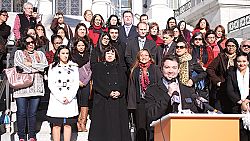Utah Latinos react to President Barack Obama's immigration announcement
Friday, Nov. 28, 2014

Intermountain Catholic
+ Enlarge
Luis Garza, executive director of Comunidades Unidas, addresses the Nov. 21 press conference on the steps of the Capitol. IC photo/Jenn Sparks
SALT LAKE CITY — On Nov. 20, about 70 people gathered at Centro Civico Mexicano in downtown Salt Lake City to witness firsthand President Barack Obama’s executive order on immigration.
As an image of the president was projected on the wall, people anxiously waited for his speech to start.
“We have heard a lot of rumors about what he is going to say,” said Veronica Macias, an Our Lady of Guadalupe parishioner who has been following all the information about immigration.
In a 15-minute address, President Obama told Americans that deporting millions is “not who we are” and cited Scripture, saying, “We shall not oppress a stranger for we know the heart of a stranger – we were strangers once, too.”
As he spoke, some people at the Centro Civico held hands or hugged their kids tightly.
The president announced that he would put additional law enforcement personnel at the Mexican border to stop illegal crossings, but also “make it easier and faster for high-skilled immigrants, graduates, and entrepreneurs to stay and contribute to our economy, as so many business leaders have proposed,” he said.
“We’ll take steps to deal responsibly with the millions of undocumented immigrants who already live in our country,” he added.
As the president ended his speech, confetti exploded at the Centro Civico, and people started clapping and cheering.
“Thank you, God,” Macias said.
However, not all Utah Latinos applauded the president’s announcement.
Ella Mendoza, who is directly affected by any changes to the nation’s immigration policy, has mixed emotions about the executive action. She came to the United States from Lima, Peru, 12 years ago. A student at Weber State University, she teaches preschool.
“I have 24 beautiful little children waiting for me who I will see Monday. … But what happens to those children when I’m gone? What happens to those children if I’m deported?” she asked.
“At first, I felt very hopeful because I thought a few of our cases with Salt Lake Dream Team might qualify for the action,” Mendoza said. “When I actually realized that some of them might not, I just felt this big letdown. This is good for a few, not good for many.”
While about 4 million immigrants who are parents of U.S. citizens will be eligible for a new legal status that would defer their deportations and allow them to legally work here, about 38 percent of immigrants are disqualified from the executive action because of their circumstances, according to the Pew Research Center, said attorney Mark Alvarez at a Nov. 21 press conference at the Capitol, adding that, he felt that the executive order was just a first step toward a better immigration system.
“Clearly, two-thirds of the undocumented population is not covered,” said Alvarez. “We should never forget those human beings, the millions of stories of people who will not be participating in this executive action.”
The Most Reverend John C. Wester, Bishop of Salt Lake City, said in a statement that “Given the incredible human suffering of the undocumented in our country and the fact that our broken immigration system plays a large part in this suffering, I am pleased that President Obama has taken executive action in favor of some of those who have yet to achieve legal status in our country. While this action has certainly be met with some opposition, I believe it is critical to remember that this is a compassionate response to real human suffering. Immigration is a reality throughout the world with about one billion people on the move.” (See statement on p. 3.)
According to a recent study by the Migration Policy Institute, 48,000 of Utah’s undocumented immigrants will qualify for temporary relief under President Obama’s executive action; the 55 percent of undocumented immigrants in the state who now qualify for the action is the highest rate in the nation, according to the report.
For questions, comments or to report inaccuracies on the website, please CLICK HERE.
© Copyright 2024 The Diocese of Salt Lake City. All rights reserved.
© Copyright 2024 The Diocese of Salt Lake City. All rights reserved.

Stay Connected With Us